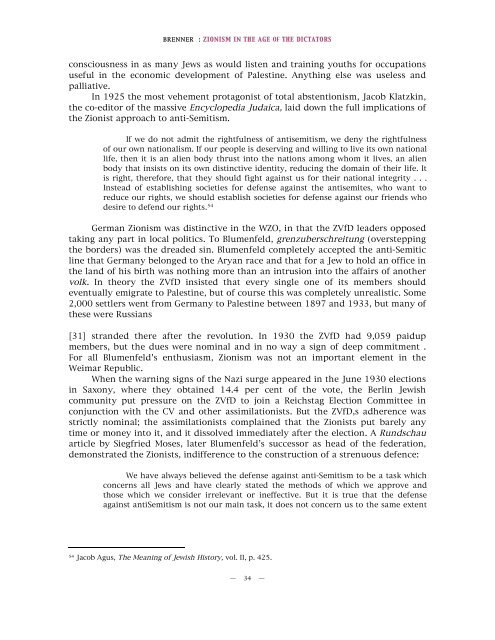You also want an ePaper? Increase the reach of your titles
YUMPU automatically turns print PDFs into web optimized ePapers that Google loves.
BRENNER : <strong>ZIONISM</strong> <strong>IN</strong> <strong>THE</strong> <strong>AGE</strong> <strong>OF</strong> <strong>THE</strong> <strong>DICTATORS</strong><br />
consciousness in as many Jews as would listen and training youths for occupations<br />
useful in the economic development of Palestine. Anything else was useless and<br />
palliative.<br />
In 1925 the most vehement protagonist of total abstentionism, Jacob Klatzkin,<br />
the co-editor of the massive Encyclopedia Judaica, laid down the full implications of<br />
the Zionist approach to anti-Semitism.<br />
If we do not admit the rightfulness of antisemitism, we deny the rightfulness<br />
of our own nationalism. If our people is deserving and willing to live its own national<br />
life, then it is an alien body thrust into the nations among whom it lives, an alien<br />
body that insists on its own distinctive identity, reducing the domain of their life. It<br />
is right, therefore, that they should fight against us for their national integrity . . .<br />
Instead of establishing societies for defense against the antisemites, who want to<br />
reduce our rights, we should establish societies for defense against our friends who<br />
desire to defend our rights. 54<br />
German Zionism was distinctive in the WZO, in that the ZVfD leaders opposed<br />
taking any part in local politics. To Blumenfeld, grenzuberschreitung (overstepping<br />
the borders) was the dreaded sin. Blumenfeld completely accepted the anti-Semitic<br />
line that Germany belonged to the Aryan race and that for a Jew to hold an office in<br />
the land of his birth was nothing more than an intrusion into the affairs of another<br />
volk. In theory the ZVfD insisted that every single one of its members should<br />
eventually emigrate to Palestine, but of course this was completely unrealistic. Some<br />
2,000 settlers went from Germany to Palestine between 1897 and 1933, but many of<br />
these were Russians<br />
[31] stranded there after the revolution. In 1930 the ZVfD had 9,059 paidup<br />
members, but the dues were nominal and in no way a sign of deep commitment .<br />
For all Blumenfeld's enthusiasm, Zionism was not an important element in the<br />
Weimar Republic.<br />
When the warning signs of the Nazi surge appeared in the June 1930 elections<br />
in Saxony, where they obtained 14.4 per cent of the vote, the Berlin Jewish<br />
community put pressure on the ZVfD to join a Reichstag Election Committee in<br />
conjunction with the CV and other assimilationists. But the ZVfD,s adherence was<br />
strictly nominal; the assimilationists complained that the Zionists put barely any<br />
time or money into it, and it dissolved immediately after the election. A Rundschau<br />
article by Siegfried Moses, later Blumenfeld’s successor as head of the federation,<br />
demonstrated the Zionists, indifference to the construction of a strenuous defence:<br />
We have always believed the defense against anti-Semitism to be a task which<br />
concerns all Jews and have clearly stated the methods of which we approve and<br />
those which we consider irrelevant or ineffective. But it is true that the defense<br />
against antiSemitism is not our main task, it does not concern us to the same extent<br />
54 Jacob Agus, The Meaning of Jewish History, vol. II, p. 425.<br />
— 34 —


